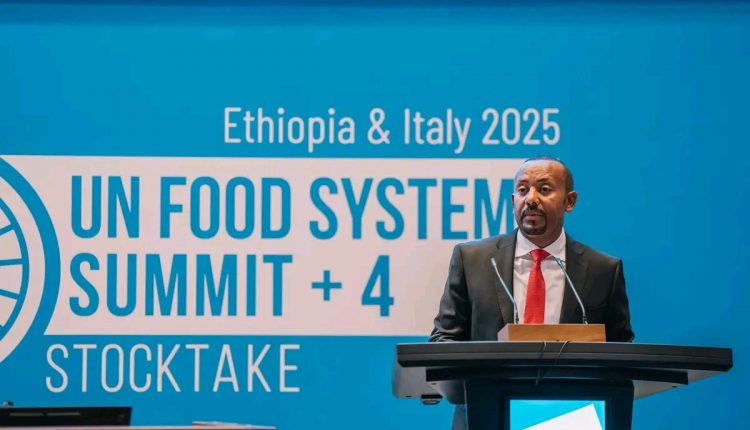Ethiopia Commits to Resilient, Locally Driven Food Systems Transformation, Says PM Abiy
Addis Ababa, July 28, 2025 (FMC) — Prime Minister Abiy Ahmed, addressing the Second United Nations Food Systems Summit Stocktaking Moment (UNFSS+4) in Addis Ababa, highlighted the mounting pressures on global food systems due to climate change, conflicts, supply disruptions, economic shocks, and widening inequalities.
In his keynote speech delivered this morning before heads of state and international delegations, the Prime Minister emphasized Ethiopia’s proactive approach to food system transformation by investing in local production, reducing reliance on imports, and building resilient systems designed to serve both current and future generations.
“Four years ago, we came together to pursue a vision for food systems that are sustainable, equitable, and resilient,” Abiy said. “Food is more than agriculture — it shapes our health, economies, environment, and future.”
He reflected on progress made since the 2021 summit but stressed the urgent need for renewed, coordinated global action.
“Globally, food systems face immense pressures from climate shocks, conflicts, inequalities, and economic disruptions. Development assistance is declining, and multilateral cooperation is under strain,” the Prime Minister warned.
“These challenges threaten production, supply, dignity, and the stability of nations. Yet, the human spirit and our shared resolve to act remain strong.”
Focusing on Ethiopia’s commitment, Abiy said the country has chosen bold, holistic action centered on human dignity.
“Transformation central to this vision is our commitment to achieving food self-sufficiency. We are investing in local production, reducing dependency on imports, and building resilient systems that serve our people and our future.”
The Prime Minister announced Ethiopia’s comprehensive roadmap for food system transformation, which aligns closely with the nation’s broader macroeconomic reforms, including the Homegrown Economic Reform agenda, and efforts to improve the overall business climate.
The roadmap guides key policy reforms in land use, agricultural development, and rural finance, laying the foundation for an inclusive, productive, and sustainable food system.
“Our goal is clear: to ensure that every Ethiopian, whether in the countryside or the city, young or old, has access to safe, diverse, and nutrient-rich food,” Abiy said.
“To achieve this, we are implementing over 700 actionable interventions.”
The UNFSS+4 Stocktaking Summit provides a critical platform for global leaders to review progress since the 2021 Food Systems Summit and to accelerate commitments toward achieving food security and nutrition for all by 2030.

